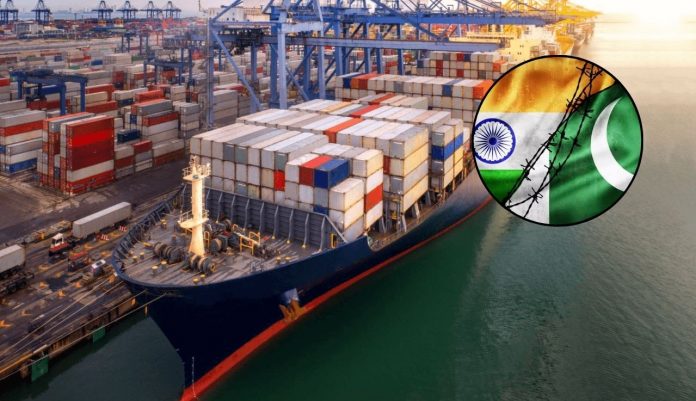India Bans Imports from Pakistan: Tensions between India and Pakistan have sharply increased after the recent terror attack in Pahalgam, Jammu and Kashmir. The Indian government has responded strongly by announcing three major actions—banning all imports from Pakistan, stopping Pakistani ships from docking at Indian ports, and suspending all incoming mail and parcels from Pakistan. These steps show India’s firm stand against terrorism and its sponsors.
All You Need to Know
- India has banned all goods imported from Pakistan
- Pakistani ships can’t dock at Indian ports
- No mail or parcels will be accepted from Pakistan
- These steps are taken for national security and public safety
- India revoked visas and suspended the Indus Waters Treaty earlier
- Pakistan tested a missile after India’s actions, worsening tensions
Ban on Imports from Pakistan
On May 2, 2025, India’s Ministry of Commerce issued a strict order banning all direct or indirect imports from Pakistan. This move applies to any Pakistani goods, even if they were earlier allowed. The decision was made under national security and public policy. Any exception to this rule now needs special approval from the Indian government.
This is not the first time trade has been hit. After the Pulwama attack in 2019, India had already imposed a 200% import duty on goods from Pakistan. After the recent Pahalgam attack, even the Wagah-Attari border was shut, ending the last trade route between the two countries.
In past years, trade with Pakistan was already small. India exported goods worth over $447 million to Pakistan between April 2024 and January 2025, while imports were just $0.42 million.
Ban on Pakistani Ships
India also stopped all Pakistani-flagged ships from docking at Indian ports. No Indian-flagged ships are allowed to visit Pakistani ports either. This action was taken under the Merchant Shipping Act, 1958, which allows such steps in national interest.
The Directorate General of Shipping (DGS) issued the order, stating it was done to protect Indian cargo, infrastructure, and overall maritime security. The restriction came into effect immediately and will stay until further notice. While ships from third countries may still be allowed, ships under the Indian or Pakistani flags are now restricted from port visits between both nations.
Suspension of Mail and Parcels from Pakistan
The third measure announced by India was to stop all incoming postal services from Pakistan. This includes letters, packages, and parcels coming through both air and land routes.
The government said this was needed for the safety and interest of Indian citizens. This cut-off of physical communication further adds to the diplomatic pressure on Pakistan.
Pakistan’s Response: Missile Test and Strong Words
While India was announcing its measures, Pakistan tested a surface-to-surface ballistic missile called Abdali with a 450 km range. This test was claimed to be part of “Exercise INDUS.” Indian sources called it a serious provocation and a desperate act by Pakistan to raise tensions.
A top Indian source said, “This planned missile test, under such volatile conditions, is nothing short of a blatant provocation.”
Earlier Measures by India
After the deadly Pahalgam attack on April 22, which killed 26 people including Indian tourists and an officer from Nepal, India started taking strong steps. The terrorists involved were linked to the Lashkar-e-Taiba group based in Pakistan.
India first suspended the Indus Waters Treaty, a 1960 agreement that gives Pakistan water from three rivers. Pakistan reacted strongly, calling it an “act of war.”
India also cancelled almost all visas given to Pakistanis, including those for medical reasons. This shows a complete freeze in people-to-people contact between the two countries.
India’s Clear Message
Prime Minister Narendra Modi held a high-level security meeting with chiefs of the Army, Navy, and Air Force. He gave them full freedom to decide India’s military response.
Later, during a joint press meet with the President of Angola, PM Modi said, “We are committed to taking firm and decisive actions against terrorists and those who support them.” He thanked Angola for standing with India during this tough time.
Why India Took These Strong Steps
The Pahalgam attack caused deep sorrow and anger across India. Most victims were innocent tourists, including children and off-duty officers. The government wants to send a clear message to Pakistan and the world that India will not tolerate terror attacks.
By banning trade, ships, and postal services, India is isolating Pakistan economically and diplomatically. The aim is to pressure Pakistan into stopping cross-border terrorism and taking action against terror groups working from its soil.
India’s tough measures after the Pahalgam terror attack show its strong stand against terrorism and its sponsors. By banning imports, ships, and mail from Pakistan, India is not only cutting off ties but also sending a strong message globally. As the situation unfolds, India has made it clear that there will be no compromise when it comes to national security.
FAQs
Why did India ban imports from Pakistan?
Because of the Pahalgam terror attack and in the interest of national security.
Can Pakistani ships dock at Indian ports now?
No, India has banned all Pakistani-flagged ships from entering its ports.
Are people allowed to send mail from Pakistan to India?
No, India has suspended all postal services from Pakistan.
What other steps has India taken against Pakistan?
India suspended the Indus Waters Treaty and cancelled most visas for Pakistanis.
What was Pakistan’s response?
Pakistan tested a missile and warned it may suspend key agreements with India.





